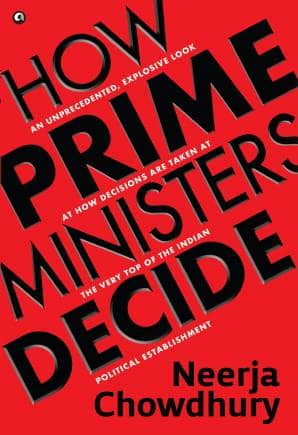



Lantern-lit boats
Littered on the sea
Which one will take me?
Towards the end of his life in 2003, strapped to a hospital bed in Apollo Hospital in New Delhi, V. P. Singh read out to me a couple of poems he had written. ‘One morning I woke up very early, and looked out of the window,’ V. P. Singh mused, ‘I saw lantern-lit boats sail towards me.’ He was at the time staying at the Raj Bhavan in Mumbai by the seaside. ‘These were small boats out at the sea with lights on them.... In our religion and mythology, they say you undertake your last journey by boat.’
VP’s kidneys had got damaged in 1994 after a dharna at Mumbai’s Flora Fountain. He was now tied to the dialysis machine every second day. Then he got myeloma, a form of blood cancer, which damaged 50 per cent of his bone marrow. The doctors advised chemotherapy—but he managed to avoid it.
He was in a reflective mood that day. Suddenly, he said, ‘All my life I scribbled.’
‘Now,’ he added, ‘I need an eraser.’
‘You come to a stage when you ask—what is the meaning of all this?’ After going out of power in 1990, he had gone back to painting and writing poetry, which he had started to do in his earlier years—first in Hindi, then in English, between interludes of dialysis. The Mandal messiah was looking back at his life’s journey. Some of the images he saw now inhabited his poems.
‘I used to play with paper boats in my childhood.... When you are finishing your journey, you are reminded of your... paper boats.’
Suddenly I found afloat
My childhood paper boat
It signalled
‘Come it’s time to go.’
▪
Vishwanath Pratap Singh was arguably the most controversial prime minister India has had.
Undoubtedly, he was chaiin or politically crafty—and he could be tough. But there was also an emotional side to him, which his poetry reflected— and it defined this complex personality. VP was a contradiction in many ways—feudal and yet not feudal, a loyalist and rebel at the same time, a man of character and a political hypocrite. Many who knew him well said that it was impossible to know the ‘real’ VP or where his loyalties lay. While he was a loyalist par excellence in the early phase of his political career, he would often say in later years that there was ‘no such thing as loyalty in politics’, it was all about the convergence of interests.
 Aleph Book Company; 608 pages; Rs 999
Aleph Book Company; 608 pages; Rs 999
What V. P. Singh did, no one else who had left the Congress over the years had managed to do. Neither Chandra Shekhar, nor Sharad Pawar, nor Ramkrishna Hegde, nor Mamata Banerjee, nor Jagan Mohan Reddy. They too had, like VP, severed relations with the Congress leadership in the 1970s, 1980s, and 1990s in the last century, and also in the twenty-first century. Hegde, Pawar, Banerjee, Reddy went on to replace the Congress in their states and became chief ministers, ironically sometimes in alliance with the Congress they had quit. Chandra Shekhar had become prime minister at the head of a rump supported by the larger, domineering Congress. But none had managed to create a national alternative to the Congress—like VP did, though it lasted just under a year.
He brought together almost all the anti-Congress forces, of the Right, Left, Centre, and the regional parties on one platform in the first truly national coalition. It was a three-tiered arrangement, in what was a rare show of Opposition unity. He gave the regional parties a stake in national governance at the centre. ‘Even when the DMK did not have a single MP, I brought it into the cabinet,’ he would say. ‘The idea was that once they start to participate in the management of the country, there would be no fissiparous tendencies.’ He saw this as one of his major achievements.
Mandal speeded up the downfall of the Congress Party which fell between the two stools of caste and community, popularly referred to as the ‘Mandal versus Kamandal’ face-off.
Breaking the ‘hegemony’ of the Congress Party, VP inflicted such a body blow on the Congress that the grand old party of India—which had ruled the country for four decades, until VP took over (barring the interregnum when the Janata Party ruled in 1977–79)—never recovered after that. Nor did it get a majority on its own. P. V. Narasimha Rao came to power in 1991 at the head of a minority government and Manmohan Singh headed a coalition for ten years from 2004–14.
VP’s emergence as Rajiv Gandhi’s successor marked the end of the rule of the Nehru–Gandhi family. No member of India’s first family, has since then, till the time of writing, led a government.
V. P. Singh’s name continues to arouse passions—reviled by some, revered by others. Some see him as a cunning politician who in a desperate attempt to retain power let a genie out of the bottle which could not be put back. Others call him the messiah of social justice, and that is the way he liked to see himself.
‘Some run governments,’ he told me, speaking about the processes he had unleashed. ‘I ran history. It will define governments and coalitions in the time to come.’
Excerpted from the chapter "The Crafty Prime Minister Who Remade Indian Politics: V.P. Singh's Mandal Gambit" in How Prime Ministers Decide by Neerja Chowdhury, with permission from Aleph Book Company.
Discover the latest Business News, Sensex, and Nifty updates. Obtain Personal Finance insights, tax queries, and expert opinions on Moneycontrol or download the Moneycontrol App to stay updated!
Find the best of Al News in one place, specially curated for you every weekend.
Stay on top of the latest tech trends and biggest startup news.